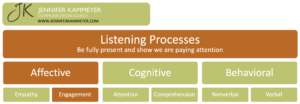In meetings we can set time limits and agendas, but in casual conversations it is much harder to know when enough is enough. Recent research is shows that we are not that good of a judge.
Those who are good meeting managers know that setting an agenda in advance, having a time manager assigned, and tabling items when things run long are effective means to ending conversations in meetings. But when it comes to more casual conversations, we are generally not taught how to end them and we are even taught it is impolite to end them. This lack of training and discomfort leads to conversations running longer than we would like.
Of 126 conversations, only 2% ended when both participants wanted them to, according to research by Adam Mastroianni, Ph.D. student in psychology at Harvard University, as reported in the Proceedings of the National Academy of Sciences. Some extraverted souls had wanted to chat longer, but 69% of the participants said they wanted the conversation to end before it did.
Mastroianni and his colleagues also surveyed 806 people on the online crowdsourcing platform Mechanical Turk, asking them to describe a recent in-person conversation—and how long they actually wished it had lasted. Similar to the lab results, 67% of people reported they wanted out before the conversation was done.
Ending Conversations is Risky Business
The nature of conversation is back-and-forth turn taking that has social rules of politeness embedded. When we engage in a conversation, we are showing interest in another person. To end a conversation, we are taking risks. We risk that whoever takes the last turn is indicating more power. We risk implying that the other person is not that interesting or no longer interesting. The rules of politeness or face-saving come into play and make it difficult.
While Mastroianni’s study shows that we may not be that good at ending conversations, there are certainly communication skills we can apply to this conundrum. As usual, the first step is moving our communication from subconscious and automatic to intentional. With that intentionality, we can be more aware of signs or cues from the other person and can use graceful, but direct means to end conversations.
Picking Up Cues
People are constantly giving nonverbal cues on how much they are interested; we can be attuned to the signs. Nonverbal indications of diminished interest – or desire to end the conversation – can include:
- Eyes to something else
- Body weight shift side to side
- Body turning slightly another direction
- One foot stepping out
- Increase in repetition of sounds like ‘uhuh’ or ‘mhm’
Ending Gracefully
When we are ready to move on, we can give nonverbal cues that we are less interested as described above or, better yet, we can use wrap-up phrases that express gratitude or refer to the future. Expressing gratitude mitigates the risk of implying the person is not interesting and referring to the future implies continued interest. We can use phrases like:
- It was so nice catching up
- Thanks for sharing
- I really appreciate your insight
- When can we chat again?
- What is on your plate for the rest of the day?
- What are you hoping to garner from this conference today?
We can also use more direct phrases that indicate clear endings and put the onus on an external factor as a means of being polite, such as:
- I am sure you are busy, so I will let you go
- I wish I could keep chatting, but I need to get back to work
Given the recent research that clearly indicates conversations are lasting longer than we wish, it seems we could all employ intentional, direct, and polite strategies to wrap things up for the benefit of our professional relationships.

